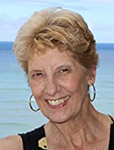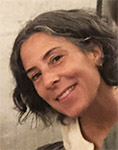Review — MY VIEW FROM THE HOUSE BY THE SEA by Donna Marie Barr (Samoa)
 My View from the House by the Sea
My View from the House by the Sea
Donna Marie Barr (Samoa 2007-2008)
Independently published
February 2022 (paperback), December 2021 (Kindle)
415 pages
$15.99 (paperback), $7.99 (Kindle)
Reviewed by Regina DeAngelo (Ghana 2000-2002)
•

Donna Marie Barr
When the average person imagines a Peace Corps experience, they might picture a red-dirt landscape in a forsaken locale. But some RPCVs get to tell a different story, of perhaps a palm-lined, tropical idyll, set beside a clear aqua sea. This is the spot on which a 57-year-old retiree named Donna Marie Barr found herself with Peace Corps “Samoa Group 78” in of June 2007.
Like many PCVs who join later than in their youth (myself included), Barr took a circuitous route to a place she’d always wanted to go. After a service in the Air Force, raising three sons, and a career in real estate management, Barr found herself starting over in her mid-fifties — divorced, retired and restless, daydreaming about leaving Colorado for Hawaii. She had read about a couple who left their careers and lives behind to sleep in a tent in Costa Rica for six months before opening an inn. “Realize there is never a right time,” they wrote. “If you wait for the right time, it will never come.”
So Barr rented out her house, and relocated to Hilo to stay for a time with a beloved uncle who lived there. In Hawaii she kept herself busy volunteering at national parks and an arts center, until she grew restless again, acknowledging that what she really wanted was to act on a long-held desire to join the Peace Corps.
Barr asked to be placed somewhere in the South Pacific (who wouldn’t?), and lucked out. Samoa (and its neighbor, American Samoa) is pretty much in the middle of the Pacific ocean, southwest of Hawaii, near Fiji. The village of Poutasi, on the southeast coast of Samoa, was where her new life began at age 57, as a student sitting on a woven laufala mat, wrapping her ears around a strange new language (Samoan has two styles of pronunciation and both a formal and informal variation), navigating the intricate web of Samoan courtesies and customs.
From her fale ‘i tai (the house by the sea), Barr chronicled vivid accounts of Samoan life which any PCV might easily picture for its resemblance their own experience: the single room in the shared family fale, frequented by small kids who had to be periodically shooed away; the relentless humidity; the luxury of a tiny, treasured refrigerator; the roosters; the chatter of neighbors outside her window in the morning; and the uniquely Peace Corps experience of life in a fishbowl.
Nicely animated by bits from her journal entries, Barr’s memoir is a chronicle of the inner and outer life of a pisikoa (a Peace Corps volunteer) in Samoa. A born writer, she used close observation to animate day-to-day life, like in this description of a typical home in Samoa:
In contrast to my family’s house, on the other end of the spectrum would have been a family of several people living in a conventional Samoan fale — a thatched roof supported by eight-inch-diamter poles with a plastic tarp pulled down on the sides at night or when the weather threatened. Shelves, boxes, tins, plastic buckets, and small cupboards held belongings. Clothes were usually kept in suitcases. Probably a single light bulb and a TV illuminated the family at night and the toilet and shower were out back near the fale kuka. Laundry was washed in a bucket and hung up to dry or laid on the rocks. It was kind of like camping for your whole life.
Wondering how any writer could manage all the detail in this memoir, I recalled that a combination of free time and solitude enabled me, and many PCVs, unprecedented time to write. I recognized my own wavy emotions in Barr’s journal; in her repeated confessions of misgivings about the whole thing, or in spending days just sitting by the sea reading (she finished 100 books), doing crossword puzzles, and hitting new records at Solitaire on her computer. (11,778; 63 seconds).
This did not cut into her work as a village-based development (VBD)volunteer, in which she worked with local officials to develop agricultural and environmental-sustainability projects, as well as building a “Homework Center”/computer lab.
It’s her details — of Samoan culture, formalities, language — that bring it all to life. The toilet paper made out of used bingo sheets. The biggest spider she’d ever seen (about 5 inches in width). Her descriptions of food:
Most commonly, meat was the ubiquitous canned corned beef, which deserves its own paragraph. One of the first canned foods to come to Samoa was pea soup, so the Samoans created a word for it — pisupo. When canned corned beef came, it was also called pisupo, which for some reason eventually came to mean corned beef. [. . .] To me it was strangely pink and very fatty. This, of course, was an American opinion about the fat — Samoans savored fat or grease of any kind and it would have been wasteful not to. When I cut the fat off a piece of meat and set it on the edge of my plate, someone in the family ate it.
Then there was the formal ranking system of Samoan culture; the intricate politics; the speechifying; the maddeningly slow pace that delayed her projects. “Samoa,” she wrote, “was in its own time zone called “Whenever.” It led her to tap a store of patience she didn’t know she had. “Fa’a Samoa,” she would say to herself, that’s just Samoan style — when in Samoa, do as the Samoans do.
And the language. She wrote:
All the protocol and appropriate behavior. . .. I feel like I’m always on the verge of doing something wrong and it’s easy to slip into feeling sorry for myself. Every day has its ups and downs, but today I’m in the melancholiest since I first arrived.
Barr writes frankly of the struggles familiar to all PCVs, anywhere in the world. Loneliness, for example. During my own service I felt at once lonely and guilty about it — I worried I wasn’t integrating enough, not spending time with my neighbors as much as the other volunteers did.
The family is genuinely warm and welcoming, and for that I’m thankful, but it’s still frustrating to share someone’s home . . .. I could hang out more with them, but it doesn’t feel comfortable. [. . .] Trying to put up with other people when you really want to be alone — and yet I’ve just said that I’m lonely. It’s so complicated!
Just like so many PCVs with their treasured short-wave radios, for comfort Barr tuned every night to Radio Australia (for me, in Ghana, it was the BBC). In her journal she captured well the love/hate thing all PCVs experience. “Frustration, anger, hurt feelings, misunderstandings, loneliness, boredom, inertia . . .,” but also “friendship, exhilaration, gratitude, kindness, satisfaction, appreciation, amusement. Sweat, lice, diarrhea, centipedes, pisupo, scary dogs, cold showers — sea breezes, beaches, mangoes . . . the laughter of children.”
When it was time to return to the states, she captured the disorienting readjustment every RPCV goes through upon reentry. Like Barr, who continued listening to Radio Australia and reading the Samoan Observer online, I fed my nostalgia with Ghana’s Daily Graphic and the BBC’s Focus on Africa for a year after getting home.
Despite the differences and obstacles, Barr made lasting friendships, one of which ended in tragedy.
Ten months after her return home to the states, on September 30, 2009, an earthquake and resulting tsunami killed 150 people in Samoa, among them some of Barr’s young students, as well as one of her closest friends. To help heal her grief, she journeyed back. She carried photographs, 600 of them, of the village, the people, lost friends, and houses before the destruction. These were treasure to the people whose houses and loved ones were lost. It was sad closure, but sweet reunion with friends, including a young woman Barr took under her wing.
My View From the House by the Sea could serve as a manual of encouragement for retired or divorced people, in-transition people, anyone ready to “change the channel,” as Barr put it. It might also serve to ballast any PCV already stationed at their post, wherever they are in the world.
•

Regina Deangilo
Reviewer Regina DeAngelo (Ghana 2000-2002) was a computer teacher in Accra and Berekum, Ghana. She divides her time between Philadelphia and Rhode Island, where she runs an intellectual-property firm with her spouse.
while i have not as yet read the book, based upon your excellent review it is something that i intend to do so very soon. it was really nice to see that although the author’s peace corps service came more than 30 years after my time as a volunteer in western samoa, she experienced so many of the same emotions, the joys and the frustrations that appear to be not only unique to samoa but to the peace corps experience in general. it will be very interesting to read the perspective of a volunteer who came to the peace corps after having accomplished so much in her life as compared to those of us who came to the peace corps at the very beginning of our “adult” lives and careers.
I can so relate to the island experience as I grew up in Guam, although there it is Spam as here in Hawaii where we now live.
IWe were PCVS in India, at same time, but met afterwords and staff in Micronesia and Malaysia, each posting different, especially India but fascinating and the ultimate assignments.
I was never lonely though, India had too much to offer, all the senses smacked sometimes all 5 at the same time.
I am a fan of PC writers, I look forward to reading this.
Great review! I served in Brazil 65-67. Very different yet strong similarities in the community hosting volunteers. My experiences are written up available via Amazon. Tomasbelsky.com.
This loving review itself of Regina De Angelo (herself Ghana 2000-2002) brought tears to my warn remembering-back-eyes this morning (Ghana 1, 1961), as well as to the story the writer Donna Marie Barr tells of her time in Samoa began at age 57 and I’m glad the book (415 pages) is not some tight 200-pager but spreads out through readers’ sensibilities as she had related it musically to me in the title of her book MY VIEW FROM THE HOUSE BY THE SEA as if from some waltz spreading over pictured memories..
[…] It was a sunny, hot Sunday afternoon in Hilo on October 28th and we gathered in the breezy air next to the building. Among those who attended were several of my former writing students, two now published authors: Hilo poet Leomi L. Bergknut, whose potent pigeon verse has been published by Bamboo Ridge Press and in other cross-cultural literary journals, and Mountain View memoirist Donna Barr, author of the 2022 Samoa Peace Corps memoir My View from the House by the Sea. […]